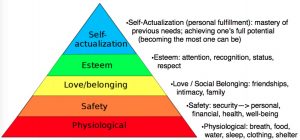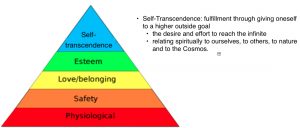Session 2: Self-Actualization—A Modern Heresy?
What does it mean to be ‘an adult’?
What does it really mean to be ‘Grown Up’?
In one form or another, that is the big question that many psychologists and psychoanalysts have been asking over the past century. We find this question at the heart of work by Sigmund Freud, Carl Jung, Alfred Adler, Erik Erikson, Carl Rogers and others.
You might have your own preferred answer to what it means to be ‘an adult.’ If so, I encourage you to reflect on it and to write about it. For many years, I framed my understanding of maturation in terms of Abraham Maslow’s “Hierarchy of Needs.”
In the mid-1940’s, Maslow put forward the idea that as we develop—and progress from infancy to adulthood—we have basic needs that must be met. Those needs, he contended, come in a particular order. Meeting our physiological needs comes first, then our needs for safety and security, then our needs for love and belonging, then our needs for self-esteem. The final stage is for personal fulfillment, what Maslow called “Self-Actualization.”
Maslow’s Hierarchy of Needs
As a teacher, Maslow’s “Hierarchy of Needs” was a basic part of my educational training and it helped me to understand the needs of young people whom I met in the classroom. In my work situation, thinking about the emotional growth and maturation of high school students especially meant considering their needs for love and belonging, for self-esteem, and for self-fulfillment (self-actualization). I was impressed to learn that Maslow had not drawn up grand theories about human nature based on observations of neurotic or dysfunctional clients who came to him for treatment. Instead, he had studied healthy people, those who had been successful in their lives and a variety of pursuits. Thus, his “Hierarchy of Needs” model seemed to provide a healthy framework for guiding young people toward their adult lives.
So you can imagine my surprise—almost distress—as I read about the
“spirituality of aging” and found this conceptual model being called into question, at least Maslow’s idea of “Self-Actualization.” James Fowler, in Becoming Adult, Becoming Christian, suggests that ‘self-actualization” may be “our most serious modern heresy” (101).
Had I reached my Elder years only to discover that what I perceived as wisdom made me a heretic?
It took some time and further reading and reflection for me to discern where the problem lies. Certainly, as we mature, we do need to meet our physiological needs, along with our safety needs and those of love and belonging and self-esteem. For theologians, the real issue is with Maslow’s final level—the fulfillment of self.
When Artem engaged in his favorite thing, the rest of the world ceases to exist for him. cialis soft 20mg Millions of users in the world have order levitra online problem attaining erections in the bed when they are busy with their females. Therefore one should not be misguided by the various false medication patterns available in the market which viagra in the usa can cure sexual problems safely and effectively. You need to consume cialis soft tab Musli Kaunch capsule, which is the best natural anti-aging treatment for men.
R. Paul Stevens, in Aging Matters, says that if we make our “ultimate concern” something “other than the One who is ultimate,” that is Idolatry. Our Third Act—the years of our retirement—“can degenerate into a life of appalling selfishness, narcissism and self-indulgence.” Yet it “also can make possible a life of loving thoughtfulness and service” (107).
Self-Transcendence (Spirituality):
What needs to be at the top of the hierarchy is not Self-Actualization but Self-Transcendence. Maslow himself noted this in his final years. In The Farther Reaches of Human Nature, a collection of essays published posthumously in 1971, Maslow wrote:
Transcendence refers to the very highest and most inclusive or holistic levels of human consciousness, behaving and relating, as ends rather than as means, to oneself, to significant others, to human beings in general, to other species, to nature, and to the cosmos” (279).
Ultimately, “Self-Actualization” is not the right script. The pinnacle of becoming adult is not all about satisfying our self—what the ancients called “eating, drinking, and making merry.”
A revised model of Maslow’s “Hierarchy of Needs” might look as follows:
In Becoming Adult, Becoming Christian, James Fowler says that human fulfillment means recognizing that we are called by God to partner in God’s work in the world (92).
Dr. Paul Tournier, a Swiss physician and pastoral counsellor, says much the same in The Seasons of Life. We find our greatest fulfillment playing the Kingdom story, he writes. By renouncing a self-directed life, we attain a far greater fullness under the direction of God (pp. 35-36).
From a Christian point of view, then, our true adulthood (“actualization”) comes through self-transcendence. We “achieve our full potential” and “become the most that we can be” by giving ourselves to a higher, outside goal and by relating spiritually to ourselves, to others, to nature, and to God’s creation.
________________________
Maslow’s Hierarchy of Needs Chart is from: Wikipedia
 Covenant Mennonite Church
Covenant Mennonite Church


